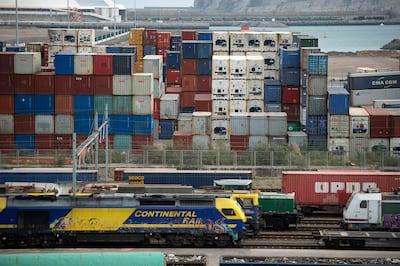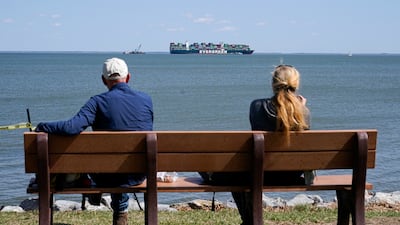The days of “just-in-time” supply chain management will end in 2022 with FinTech start-ups perfectly poised to tap this space as global trade is reset amid the Ukraine war, Covid-19 and climate change demands.
David Hansom, partner, global procurement at law firm Clyde & Co, told delegates at the Trade & FinTech forum hosted by the Arab-British Chamber of Commerce in London, that supply chain models as we know them will change from this year.
“From a geopolitical perspective, there are very real threats to the just-in-time supply chain,” Mr Hansom said. And this year will mark the end of businesses ordering goods that arrive days later to fulfil an order, he said.
This is not simply because of the Russian invasion of Ukraine but also the increasing physical, financial and non-financial barriers creeping into the market from sanctions, to the fallout from the Covid-19 pandemic, soaring shipping costs, tighter regulation and the complications of Brexit, he said.
“There are obviously a range of new sanctions. Those sanctions, whether we like it or not, impact on the trade we all do. There's the risk of blocked trade routes and the risk of deliveries being delayed,” Mr Hansom said.
However, Brexit and the imposition of financial barriers to trade are also having an effect, he said, despite new trade deals being introduced in the UK, many of which are a “copy and paste” of the exiting deals the EU has in place.
“In the absence of a trade agreement, new barriers are imposed [with] limitations on how much can be imported; limitations on when it can be imported and through what channels and the taxes that apply,” Mr Hansom said.
As a result, the just-in-time model, first adopted by goods and services producers across globe in the 1950s, could be coming to an end.
The concept came into play when Toyota engineer Taachi Ohno saw the model as a way of eliminating “waste” in the production and movement of goods.
Instead of wasting time, labour and money by storing key components in warehouses or next to assembly lines, Ohno’s idea required suppliers to only deliver what was needed – reducing the need for businesses to spend on maintaining inventories.
Fast forward to the modern day and every supplier is expected to deliver products promptly to the next buyer in the supply chain – an increasingly challenging prospect over the past two years after the Covid-19 pandemic hammered the global economy and closed factories and businesses.
While consumers are continuing to spend, shrugging off rising inflation, the just-in-time world is becoming increasingly prone to crisis as businesses grapple with the Ukraine war, rising fuel prices and escalating shipping rates.
As a result, retailers, anxious to ensure they are not again caught up in delays, are building up inventories to meet expected spells of peak demand, juggling "just in time” and “just in case” inventory management.
Add the heightened scrutiny on the environmental effects of supply chains, as well as ethical sourcing, and it is easy to see why the supply chain models of today will have to change.
“So, is it sustainable to fly beef from Australia? Is it sustainable to produce 80 per cent of the world's lithium from one country, against the backdrop of the electric vehicle?” Mr Hansom said.
'Bright future for FinTech'
With rising inflation – set to hit double digits in the UK this year – also posing a challenge, companies will increasingly need to adopt FinTech as a way of revolutionising the supply chain.
“Supply chains should be robust, sustainable and set up for success,” Mr Hansom said.
“That means that you've got people working together to drive change to deal with global problems head on ... and FinTech in all of its many guises is perfectly placed to tick all three of those boxes.”
With about 26,000 FinTech businesses operating globally employing 500,000 people, and 30 per cent of retail customers in banking using at least one service from a non-traditional bank provider, the future for FinTech is bright, said Mr Hansom.
Clyde & Co’s blockchain consultancy, for example, is already writing contracts for the shipping industry that are automated, a move that stops people making decisions about when payments are due or when an insurance premium charge can be refunded.
An example of this is the insurance premiums for cargo ships travelling to more dangerous waters where they are at risk of piracy.
Internet of Things' sensors report back to the insurer and the premium goes up for the duration of that part of the journey in which danger lurks, rather than for the entire crossing.
With more scrutiny on corporate social responsibility, and improvements needed in the audit trail and accountability of supply chains, Mr Hansom predicts “a real growth market in ethical contracting”.
“In the next five to 10 years, I see the trust that can build into supply chains through blockchain, through the use of distributed ledger technology," he said.
"This has been absolutely transformational, in the context of driving up trust, driving up security, speeding up supply chains and derisking transactions.”
With customers looking at how a business approaches technology and its compliance with best practices globally, as well as decarbonisation, Mr Hansom said there is so much scope to use technology to drive down carbon production and to improve supply chain flows.
"The market is ready for those bright ideas, ready for those seed funders, ready for those start-ups, ready for those investors to have a good idea and to run with it," he said.
Mohammed bin Zayed Majlis
What is blockchain?
Blockchain is a form of distributed ledger technology, a digital system in which data is recorded across multiple places at the same time. Unlike traditional databases, DLTs have no central administrator or centralised data storage. They are transparent because the data is visible and, because they are automatically replicated and impossible to be tampered with, they are secure.
The main difference between blockchain and other forms of DLT is the way data is stored as ‘blocks’ – new transactions are added to the existing ‘chain’ of past transactions, hence the name ‘blockchain’. It is impossible to delete or modify information on the chain due to the replication of blocks across various locations.
Blockchain is mostly associated with cryptocurrency Bitcoin. Due to the inability to tamper with transactions, advocates say this makes the currency more secure and safer than traditional systems. It is maintained by a network of people referred to as ‘miners’, who receive rewards for solving complex mathematical equations that enable transactions to go through.
However, one of the major problems that has come to light has been the presence of illicit material buried in the Bitcoin blockchain, linking it to the dark web.
Other blockchain platforms can offer things like smart contracts, which are automatically implemented when specific conditions from all interested parties are reached, cutting the time involved and the risk of mistakes. Another use could be storing medical records, as patients can be confident their information cannot be changed. The technology can also be used in supply chains, voting and has the potential to used for storing property records.
Racecard
%3Cp%3E1.45pm%3A%20Bin%20Dasmal%20Contracting%20Cup%20%E2%80%93%20Maiden%20(PA)%20Dh50%2C000%20(Dirt)%201%2C200m%3Cbr%3E2.15pm%3A%20Al%20Shafar%20Investment%20Cup%20%E2%80%93%20Maiden%20(TB)%20Dh60%2C000%20(D)%201%2C200m%3Cbr%3E2.45pm%3A%202023%20Cup%20by%20Emirates%20sprint%20series%20%E2%80%93%20Handicap%20(TB)%20Dh84%2C000%20(D)%201%2C200m%3Cbr%3E3.15pm%3A%20HIVE%20Cup%20%E2%80%93%20Handicap%20(TB)%20Dh68%2C000%20(D)%201%2C400m%3Cbr%3E3.45pm%3A%20Jebel%20Ali%20Mile%20Prep%20by%20Shadwell%20%E2%80%93%20Conditions%20(TB)%20Dh100%2C000%20(D)%201%2C600m%3Cbr%3E4.15pm%3A%20JARC%20Cup%20%E2%80%93%20Maiden%20(TB)%20Dh60%2C000%20(D)%201%2C600m%3Cbr%3E4.45pm%3A%20Deira%20Cup%20by%20Emirates%20Sprint%20series%20%E2%80%93%20Handicap%20(TB)%20Dh76%2C000%20(D)%201%2C950m%3C%2Fp%3E%0A
Revival
Eminem
Interscope
The five pillars of Islam
How to wear a kandura
Dos
- Wear the right fabric for the right season and occasion
- Always ask for the dress code if you don’t know
- Wear a white kandura, white ghutra / shemagh (headwear) and black shoes for work
- Wear 100 per cent cotton under the kandura as most fabrics are polyester
Don’ts
- Wear hamdania for work, always wear a ghutra and agal
- Buy a kandura only based on how it feels; ask questions about the fabric and understand what you are buying
The White Lotus: Season three
Creator: Mike White
Starring: Walton Goggins, Jason Isaacs, Natasha Rothwell
Rating: 4.5/5
COMPANY%20PROFILE%20
%3Cp%3E%3Cstrong%3ECompany%20name%3A%20%3C%2Fstrong%3ENomad%20Homes%3Cbr%3E%3Cstrong%3EStarted%3A%20%3C%2Fstrong%3E2020%3Cbr%3E%3Cstrong%3EFounders%3A%20%3C%2Fstrong%3EHelen%20Chen%2C%20Damien%20Drap%2C%20and%20Dan%20Piehler%3Cbr%3E%3Cstrong%3EBased%3A%3C%2Fstrong%3E%20UAE%20and%20Europe%3Cbr%3E%3Cstrong%3EIndustry%3C%2Fstrong%3E%3A%20PropTech%3Cbr%3E%3Cstrong%3EFunds%20raised%20so%20far%3A%3C%2Fstrong%3E%20%2444m%3Cbr%3E%3Cstrong%3EInvestors%3A%3C%2Fstrong%3E%20Acrew%20Capital%2C%2001%20Advisors%2C%20HighSage%20Ventures%2C%20Abstract%20Ventures%2C%20Partech%2C%20Precursor%20Ventures%2C%20Potluck%20Ventures%2C%20Knollwood%20and%20several%20undisclosed%20hedge%20funds%3C%2Fp%3E%0A
COMPANY%20PROFILE%3A
%3Cp%3E%3Cstrong%3EName%3A%3C%2Fstrong%3E%20Envision%3Cbr%3E%3Cstrong%3EStarted%3A%20%3C%2Fstrong%3E2017%3Cbr%3E%3Cstrong%3EFounders%3A%20%3C%2Fstrong%3EKarthik%20Mahadevan%20and%20Karthik%20Kannan%3Cbr%3E%3Cstrong%3EBased%3A%3C%2Fstrong%3E%20The%20Netherlands%3Cbr%3E%3Cstrong%3ESector%3A%3C%2Fstrong%3E%20Technology%2FAssistive%20Technology%3Cbr%3E%3Cstrong%3EInitial%20investment%3A%3C%2Fstrong%3E%20%241.5%20million%3Cbr%3E%3Cstrong%3ECurrent%20number%20of%20staff%3A%3C%2Fstrong%3E%2020%3Cbr%3E%3Cstrong%3EInvestment%20stage%3A%3C%2Fstrong%3E%20Seed%3Cbr%3E%3Cstrong%3EInvestors%3A%3C%2Fstrong%3E%204impact%2C%20ABN%20Amro%2C%20Impact%20Ventures%20and%20group%20of%20angels%3C%2Fp%3E%0A
COMPANY%20PROFILE
%3Cp%3E%3Cstrong%3EName%3A%3C%2Fstrong%3E%20Carzaty%2C%20now%20Kavak%3Cbr%3E%3Cstrong%3EBased%3A%3C%2Fstrong%3E%20Dubai%3Cbr%3E%3Cstrong%3ELaunch%20year%3A%20%3C%2Fstrong%3ECarzaty%20launched%20in%202018%2C%20Kavak%20in%20the%20GCC%20launched%20in%202022%3Cbr%3E%3Cstrong%3ENumber%20of%20employees%3A%3C%2Fstrong%3E%20140%3Cbr%3E%3Cstrong%3ESector%3A%3C%2Fstrong%3E%20Automotive%3Cbr%3E%3Cstrong%3EFunding%3A%20%3C%2Fstrong%3ECarzaty%20raised%20%246m%20in%20equity%20and%20%244m%20in%20debt%3B%20Kavak%20plans%20%24130m%20investment%20in%20the%20GCC%3C%2Fp%3E%0A
Mohammed bin Zayed Majlis
Company info
Company name: Entrupy
Co-founders: Vidyuth Srinivasan, co-founder/chief executive, Ashlesh Sharma, co-founder/chief technology officer, Lakshmi Subramanian, co-founder/chief scientist
Based: New York, New York
Sector/About: Entrupy is a hardware-enabled SaaS company whose mission is to protect businesses, borders and consumers from transactions involving counterfeit goods.
Initial investment/Investors: Entrupy secured a $2.6m Series A funding round in 2017. The round was led by Tokyo-based Digital Garage and Daiwa Securities Group's jointly established venture arm, DG Lab Fund I Investment Limited Partnership, along with Zach Coelius.
Total customers: Entrupy’s customers include hundreds of secondary resellers, marketplaces and other retail organisations around the world. They are also testing with shipping companies as well as customs agencies to stop fake items from reaching the market in the first place.



